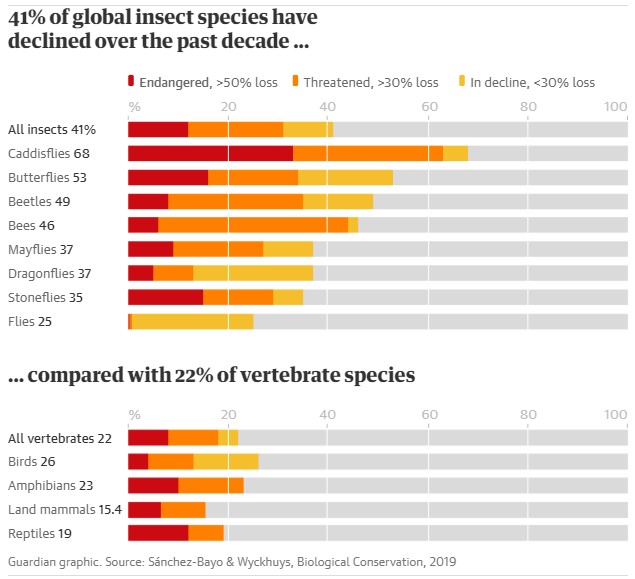The Ecological Crisis
Climate change is driving widespread changes in the abundance, distribution and ecology of England’s wildlife, and will continue to do so for decades to come as the rate of this change is increasing. Pressures upon wildlife come from many other sources too, including agricultural management, urbanisation, pollution, woodland management and invasive non-native species.
Lower down the wildlife food chain, our insects are hurtling down the path to extinction, threatening a “catastrophic collapse of nature’s ecosystems”, according to the first global scientific review published in 2019.

Source: Guardian 10/2/2019
More than 40% of insect species are declining and a third are endangered, the analysis found. The rate of extinction is eight times faster than that of mammals, birds and reptiles. The total mass of insects is falling by a precipitous 2.5% a year, according to the best data available, suggesting they could vanish within a century.
The UK has suffered the biggest recorded insect falls overall, with butterflies and moths are among the worst hit. For example, the number of widespread butterfly species fell by 58% on farmed land in England between 2000 and 2009. The scientists agree that it is becoming clear that insect losses are now a serious global problem.
“The evidence all points in the same direction,” said Prof Dave Goulson at the University of Sussex in the UK. “It should be of huge concern to all of us, for insects are at the heart of every food web, they pollinate the large majority of plant species, keep the soil healthy, recycle nutrients, control pests, and much more. Love them or loathe them, we humans cannot survive without insects.”
To find out more about how you can help to reverse the ecological crisis, explore the Biodiversity section
If you would like to submit photos or write a blog on this topic we would love to hear from you: email hello@re-betchworth.org.